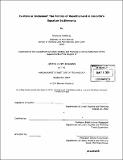Eviction or inclusion? : the politics of resettlement in Calcutta's squatter settlements
Author(s)
Chattaraj, Shahana, 1976-
DownloadFull printable version (6.210Mb)
Alternative title
Politics of resettlement in Calcutta's squatter settlements
Other Contributors
Massachusetts Institute of Technology. Dept. of Urban Studies and Planning.
Advisor
Balakrishnan Rajagopal.
Terms of use
Metadata
Show full item recordAbstract
Summary: This thesis explores the relationship between politics, urban governance and tenure security in informal settlements in the city of Calcutta. A secure place of living for the urban poor is critically important both from a human rights perspective, as well as an economic development perspective. Planners concerned with both human rights and economic welfare require an understanding of the policies, strategies, and actions leading to tenure security. In this thesis I demonstrate how tenure security in post-independence Calcutta has functioned along a two-pronged model, where some slums have been legalized due to historical and political reasons, whereas others with equally strong claims to official recognition (as per the legal definition of slums) have been denied their existence and basic rights. Residents of the non-recognized slums have managed, through political contacts and with the help of non-governmental organizations, to ease a measure of services, as well as government-issued documents that testify to their residence in the unrecognized slums. But these measures provide a perception of security that is very precarious. Calcutta is on the threshold of a number of environmental and infrastructure improvement projects, as well as unprecedented private housing and commercial developments. Many of these projects will require the eviction of vast numbers of already impoverished squatters living in unrecognized slums. In this milieu, residents of unrecognized areas face the very urgent and real threat of eviction without any form of rehabilitation, due to their "illegal" status. At this juncture, it is critically important to make a case for their legality and inclusion, based on the West Bengal government's own history of progressive slum regularization, so that "illegal" residents may be adequately and fairly compensated for any relocation, rather than forcibly and brutally removed. In this thesis I make such a case. Further, my analysis highlights the need to consider the role of political parties, their ideology and the competition between them within the discussions on tenure security. Unlike upgrading, environmental improvement and even service provision, urban land reform requires political motivation, without which international policy recommendations, donor guidelines and human rights norms cannot ensure shelter security for the vast majority of the urban poor. Thus, for squatters and their advocates in the nongovernmental sector to be successful in achieving tenure rights, their efforts should be geared towards influencing political motivation. This would require them to work within the framework of electoral politics, either with the government, or with opposition parties to make their demands heard. The mistrust of political opportunism in non-governmental circles and amongst donors, planners and bureaucrats might result in missed opportunities for gaining public support, building effective alliances and using political competition as a means for furthering the cause of the urban poor. Access to land can be a tool for both inclusion and exclusion from urban political and social processes, as is demonstrated by the history of Calcutta's land tenure policies. While the "politics of stealth" through which squatters gradually acquire rights is a commendable survival tactic, the continuing lack of official recognition is a powerful indication that illegal slum dwellers are not considered equal residents of the city, nor entitled to official service provisions. Their continued safety depends on lower-level political connections, some NGO advocacy and administrative inertia. Despite providing perceptions of security, these supports can be withdrawn at any time.
Description
Thesis (M.C.P.)--Massachusetts Institute of Technology, Dept. of Urban Studies and Planning, 2003. Includes bibliographical references (leaves 120-126).
Date issued
2003Department
Massachusetts Institute of Technology. Department of Urban Studies and PlanningPublisher
Massachusetts Institute of Technology
Keywords
Urban Studies and Planning.